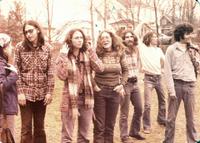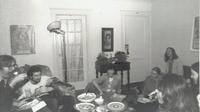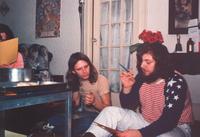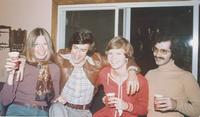********
Communes were very different in the Seventies in Boston from the Sixties concept of Drugs, Sex and Rock and Roll. Oh, a few people smoked pot here and there, but it wasn't mainstream and not as a group. Communes had by then become experiments in alternative living and were taken seriously as such. The people living in them were older and had jobs. They were stimulating to be with, being fellow seekers.

I lived in a commune of eight people for six months, then moved to a smaller one. This shot is fuzzy, taken with no flash, no tripod, and no light. I'm the only one dressed in the photo, to the far left:-) Different communes had different feelings about nudity. The two women living here felt comfortable going to and from their baths nude, the one guy in his skivies, the others in robes. In the second commune, a woman who posed as a model at the art school at B.U. often wore just a sarong under huge swaying breasts. I admit my modesty. My nudity is reserved for the bath and other private occasions. When we did the nude male calendar, one of our models lived in a huge commune where nudity was also taken for granted--except with Jack. His female love (she was 40, he was 45 and dropping out of the business world) saw his being a model as one way to overcome this, so we posed him all over the commune one Saturday morning, as other members came and went, with no more than a casual, 'hi Jack'.:-)
******

This photo was after the move to the second commune and was taken before leaving for the People's Revolutionary March in Concord, Massachusetts. We weren't marching against the Vets. We were marching to bring our boys home. Ford was now in office and would be in Concord the next day. The night before the confrontation with Ford, we camped,thousands of us--the six of us lying like sardines sideways in a two man tent. There was a big concert in the hills that night, too. Phil Ochs sang 'I'm Not Marching Anymore', one of his last concerts before his tragic suicide. Other singers I no longer remember. I'm not in this photo. The man to the far right was the love of my lifetime(or so I thought at the time) and commune mate for 3 1/2 years before we left on our boat trip.
***

In the communal main living area with friends in for a meal. Two were Psychology Interns from the VA where I worked outside of Boston. The woman with blonde hair pulled back was the intern I supervised, now in private practice outside of Boston. This was Mexican meal night. We all chipped in with the cooking and created a feast. I took the photo.
*****

Two other commune mates, Eva and Vortek. We'd taken our 22 foot sailboat out to one of the islands off of Boston Harbor. That's Boston in the background. Eva had escaped Poland right before the Communist takeover, leaving behind the man she was in love with. He was one of the Resistance leaders and couldn't leave. Vortek was in love with Eva and so he escaped and came to be with her while she was still living in Manhatten. They eventually grew to love each other, but I was always convinced her heart still belonged to the man in Poland. Eva was going for her graduate degree at Harvard and Vortek worked as a foreign car repairman.
*****

What can I say??:) The type of clothes often seen. This guy was over helping us make paper ornaments for the Christmas tree that year.
*****

And, finally, a trip up to the Berkshires for the Boston Symphony Concert and camping with R, my then love.
*****

This is me, cleaned up and hair curled, at a party with several of my work colleagues, two other Psychologists at the VA and a female intern. It was interesting being part 'hippie' by night and weekend and hard-working normal looking psychologist by day. Everyone at the VA knew I lived in a commune. No secret. It bothered a couple of the older, conservative nurses at first until they got to know me, then it was no big deal to anyone.
C'est la vie!

13 comments:
pris,
goddess, that was interesting, and photos too! i'd like to hear more of your anti-war, bring the boys home, stories. i think cindy sheean is our new mother jones! thanks for the wonderful entry! warmly, c
Hi Chella
I actually have more 'waiting/working in Hawaii for hubby to come back' stories and Nam stories per se than antiwar stories, though I have those, too. After I heard first hand what the guys in the jungles went through--kids, most of them, I was more determined than ever to do whatever I could to stop it. I'll save those stories for a while, but promise I'll do a doc on those down the way, too.
One of the huge desires or ambitions or notions I had during those years was to live in a commune. It would easily have been possible in Minneapolis in the 70's when I was a college student, but with one thing and another I never did (I lived briefly with roommates but not what I'd call a commune).
But I knew many people who lived that way, and I still know some who do. Smells are notorious for connecting to memories -- if I smell brown rice or soybeans cooking (especially in a warm steamy kitchen), or patchouli (oh my god, patchouli!), or certain types of incense, or -- sometimes -- wet wool in snow, I travel right back to those years.
I've had a sneaking suspicion for a long time that sooner or later I would eventually live in a retired hippies' commune, whatever that would be. That still lies ahead.
Hi Lyle
At the time I lived in one, there were quite a number of people with 'white hair'...age indeterminant...scattered among the communes. They make a sensible way to live in elder years, if not ill. And you're right about the food. Certain foods take me right back, too. I don't remember many 'traditional' meals during those times and, while I wasn't vegetarian then, since so many were, the bulk of our meals were just that, with cheese or egg as the protein.
Thanks for stopping by.
Hi Pris,
Thank you for sharing your memories. Love the pictures too. I really enjoyed reading this.
Thanks, Tammy
That was a time to remember!
Hi Michael
Kids of the earlier communes tended to be shunned more since they often had odd names and wore clothes unlike the other kids. By the seventies, I knew of a few communes with children growing up in them a there wasn't that big of a distinction. A factor may also have been living in Boston, since all one had to do was go over to Cambridge and everybody looked as if they walked out of a commune.
I've wondered how many still exist. I've not heard of any.
Promise one on the war/protest days will come up soon. This one was a lot of work scanning and uploaded the pics, after finding them.
I'm glad you enjoyed. See what you started??:-)
I had a friend who lived on a commune as recently as 1997... didn't stay in touch long after he moved there, so I don't know much about the life he lived, but I know that there are a few left around... thanks for sharing your stories pris... it's fun to read this stuff.
Hi Erin
I'm glad to hear they're still around. I don't think they exist in South Florida, but who knows? If you ever do hear from your friend again I'd be interested in what they're like now, since they changed a lot just between the sixties and seventies.
Pris,
Great photos and narrative accompanying them.
I had a wonderful experience living in several communes in the early 70's, two on farms of over 100 acres.
Also marched against the war in Vietnam. Your comments about being against the war but for the boys fighting it, trying to bring them home, understood. i've spoken with a number of veterans that fought in that war and it hurts to know that there are those who feel we were marching against them.
There are communes folks speak of today but I don't know a lot about them. I've heard some still exist around Floyd, Virginia and I beleive the Farm still exists in Tennessee, though I understand the nature of it, ideally, has changed.
Thanks for sharing this
ginger~
Ginger
How neat to find someone with shared experiences. I would imagine a commune in countryside that could be more self-sufficient would be even more exciting than a city one, but the city was where my work was.
Yes, consciousness has changed so much since those days that the communes that still remain are bound to have changed in response.
Pris, the only way that I would hear from that friend again is if a custody battle over my daughter ensued when I get married... so I guess it really isn't a friend, is it? The place he and his wife lived was in Legget, CA... don't know if that helps any. :)
Hi Erin
Nope, let's let that one go. I did hear from an old friend just today who teaches in Boulder, telling me he'd just read an article about a commune much like I'd described outside of the city, but perhaps with different ideals. He didn't know anything personally about it.
Post a Comment